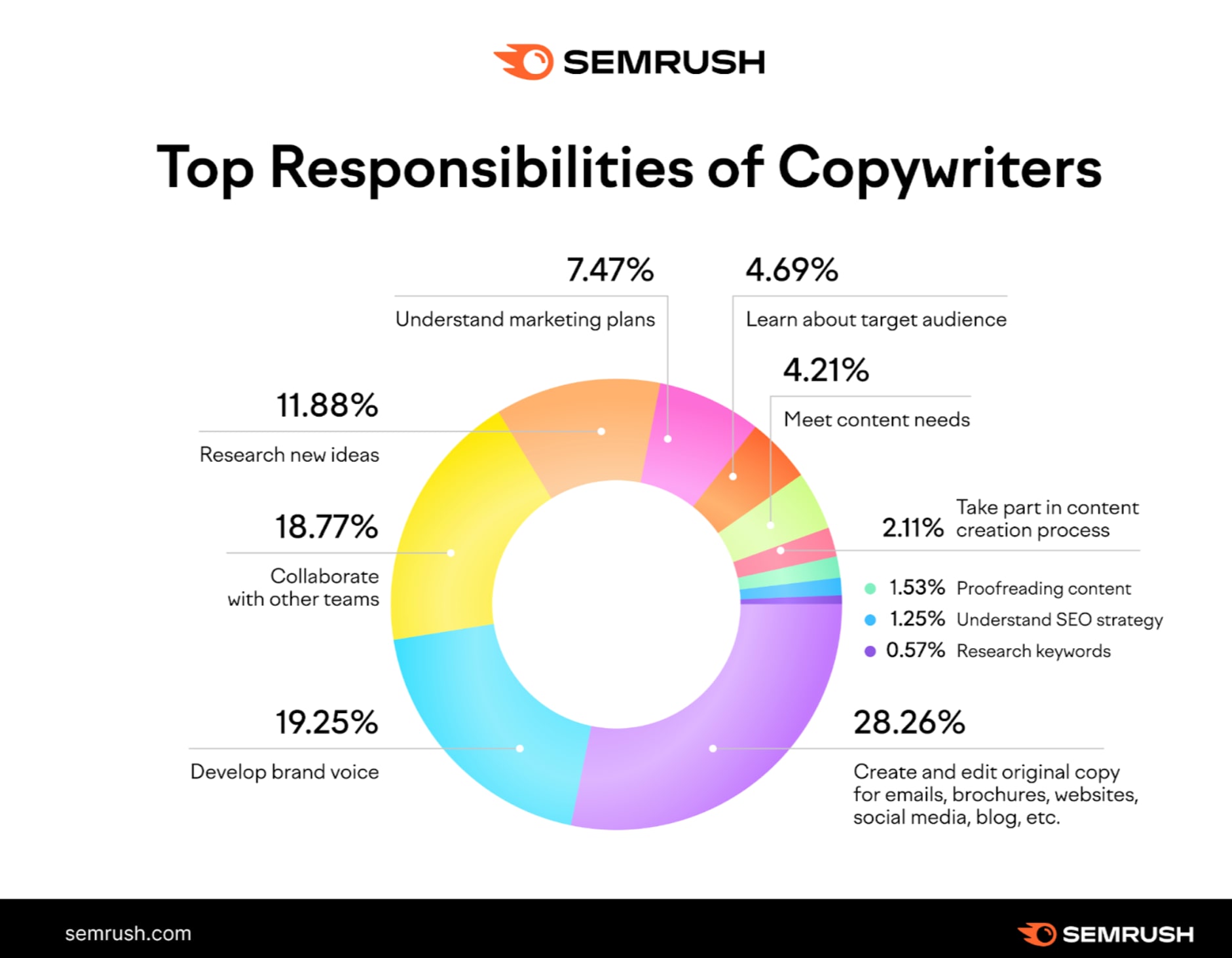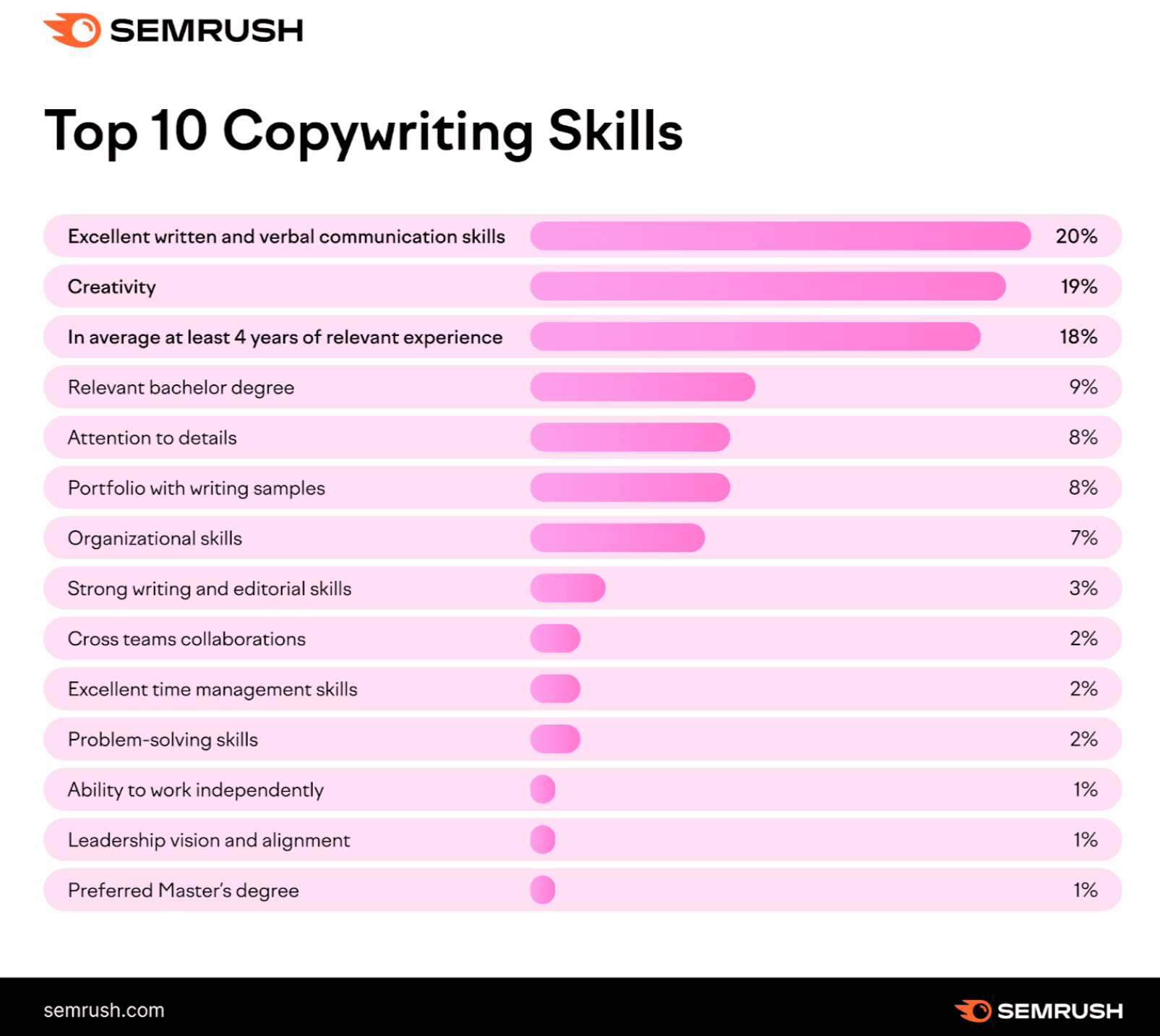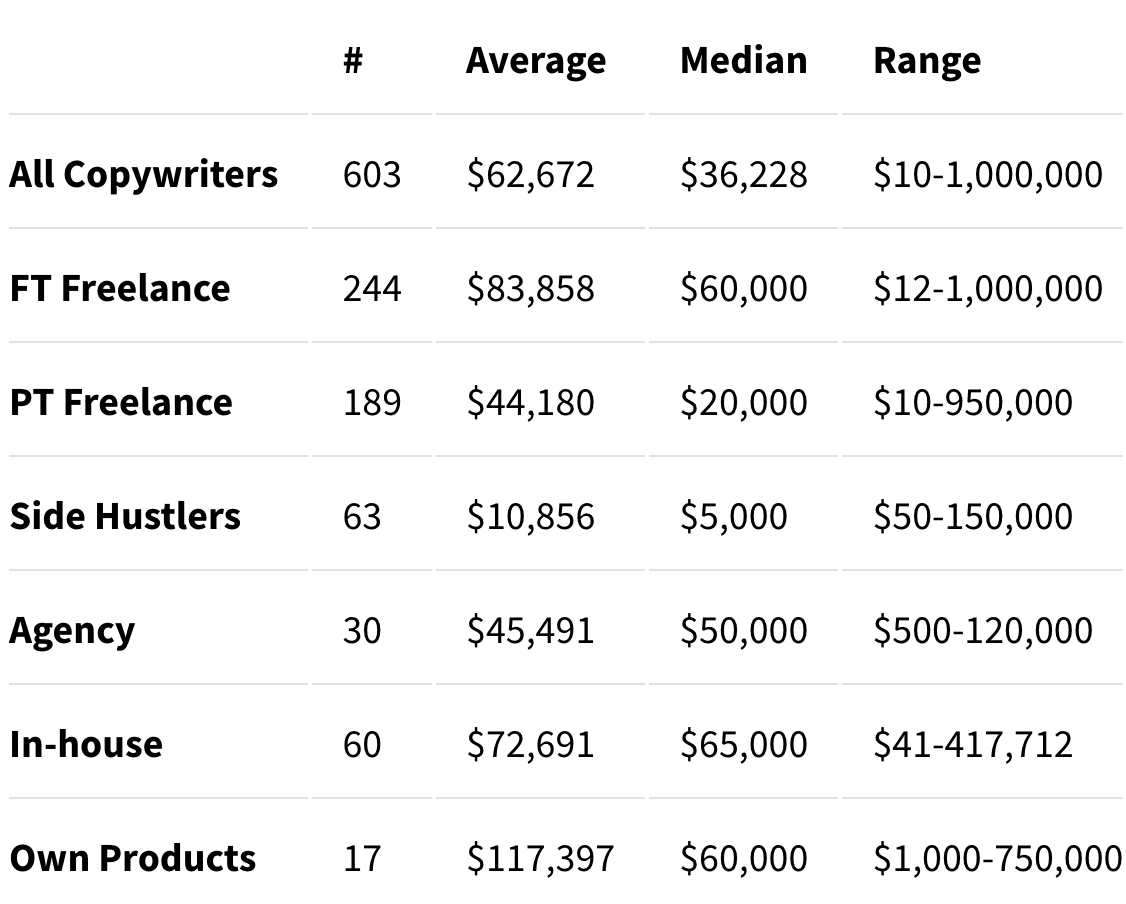How Do You Become a Copywriter? A Practical Guide on How to Start Copywriting
Copywriting is about creating content for ads or marketing, but how do you start? This guide covers key skills, building a portfolio, finding clients, and growing your career as a successful copywriter.
 January 22, 2025
January 22, 2025 6 minute reading
6 minute reading
Copywriting is a crucial element in advertising and marketing. It entails writing engaging and persuasive words, also known as copy, to encourage audiences to take action.
As a career path, copywriting gives you flexibility. While some businesses may hire full-time copywriters, you can also work freelance. Moreover, copywriting gives you room to exercise your creativity. You get to work on diverse projects and collaborate with clients across industries like healthcare, finance, and retail.
This practical guide will walk you through how to start a career in copywriting and what it takes to be a professional copywriter, covering topics like choosing a copywriting niche and setting prices for your services.
What does a copywriter do?
Before we cover what copywriters do, let’s talk about how copywriting differs from content writing. These two terms are often used interchangeably and have sparked a copywriting vs. content writing discussion.
Copywriting focuses on writing persuasive copy designed to trigger an action, while content writing aims to provide value-adding and engaging content. Both use the power of effective storytelling to build connections and create unique experiences for your audience. However, these two practices also differ in their purpose, emotional approach, and relationship to sales.
With that out of the way, let’s talk about what a copywriter does, including day-to-day responsibilities and the types of content you’ll be creating. Your responsibilities will depend on the kind of project you’re working on and the client’s requirements. These may entail doing research and admin tasks, attending meetings, submitting proposals, and writing.
The types of content a copywriter crafts include:
Direct Response – This includes writing compelling advertising copy to get an immediate response from your audience. You can see examples of this in sales letters and emails, landing pages, and pay-per-click ads.

Five Pathways Financial
Business-to-Business (B2B) – When writing copy for other businesses, you must keep in mind that you’re still writing for people. You must understand the business's pain points while writing engaging and persuasive copy. You can find examples of B2B copywriting in landing pages, newsletters, and ads.
Social Media Copywriting – This type of copywriting goes beyond crafting click-worthy posts. It’s also about creating copy that works well with visual components and is personalized to your audience on a particular platform. Social media copy tends to be brief and may be used for paid ads. This type of copy is also subject to KPIs, which will vary depending on the platform you’re using.
Website Copywriting – This involves writing copy that enables brands to convey a clear message and communicate their offerings to their target audience. As a copywriter, you’ll be combining your creative writing skills with aspects like optimizing your copy for search engines, crafting compelling CTAs, and ensuring that your copy fits the brand’s tone.
Your work environment (in-house or freelance) can also influence your daily activities. For example, an agency copywriter might check their email, review the projects they’re working on, and write copy. They might also attend meetings or brainstorming sessions and work with different people or teams throughout the day. Meanwhile, a freelance writer might check messages and respond to emails, write copy, find clients, and send invoices.
Alexa Nizam, a successful freelance copywriter on Fiverr, gives us a glimpse of what a typical day looks like for her. “My workday is more flexible than in my full-time role. I'll work a couple of hours first thing in the morning, take a break, then work a couple more hours in the afternoon. If I need to, I'll do more in the evening. It's more effective for me to be really focused for a few hours and then step away.”
She adds: “I've tried to set boundaries. I try not to work on Sundays, though I bend that rule a lot. What's really helpful is understanding that once I've accomplished what I set out to accomplish for the day, I'm done.”

Semrush
It’s worth noting that the responsibilities of copywriters have greatly changed over the years. As a copywriter, you won’t just be creating written copy. You may also be required to write scripts for audio ads, explainer videos or ads, chatbot conversations, and film or TV shows.
The best copywriters know how to use reliable copywriting tools and software. These will help you consistently deliver high-quality work and streamline your creative process. Here are some tools that can come in handy for various copywriting tasks:
Content Creation and Editing – Tools like Grammarly and Hemingway Editor let you craft engaging copy that’s readable, error-free, and aligned with your client’s requirements.
SEO – Tools like Semrush and Moz help you identify ranking keywords and analyze your competitors’ strategies to optimize your content and boost your copy’s online visibility.
Project Management – These tools help you keep track of multiple projects, collaborate with team members, and create customized workflows. Popular project management tools include Monday.com, Asana, and Trello.
Find a Content Strategy Expert for Hire
How to become a copywriter
There’s no one-size-fits-all approach to becoming a copywriter. In this section, we’ll be sharing a step-by-step guide on how to get started as a copywriter.
1. Develop copywriting skills
To start copywriting, the most basic requirement is to have excellent writing and communication skills. You must write clear and compelling copy that communicates your ideas to your target audience. The bottom line: your writing should convey how a certain product or service could benefit customers.
According to Semrush’s research, the top copywriting skills are as follows:
Excellent written and verbal communication skills – 20%
Creativity – 19%
At least four years of relevant experience – 18%

Semrush
Meanwhile, good communication skills help you understand your clients, including their business needs, vision, and style guides. Aside from these core skills, you must be adaptable. A skilled writer can shift their approach and customize it to fit their clients’ requirements, brand voice, and business goals.
You also need to develop your research and analytics skills. These help you craft informative and value-added content for your target audience. Brushing up on marketing fundamentals can help you leverage marketing and sales techniques. You can then use these skills to tell a story more effectively and connect to your audience through your copy.
Having good SEO skills allows you to craft copy that drives traffic to your client’s website, improves their online visibility, and creates better customer experiences.
One other thing worth mentioning is using AI tools in content marketing. These include audience research and content creation tools designed to improve your workflow, boost creativity, give you valuable insights, and drive strategic growth. One way to use these tools to develop your writing abilities is by leveraging their insights to craft personalized content like targeted ads that will engage your audience. You can also use copywriting prompts to brainstorm ideas for persuasive copy.
2. Get training and education
As mentioned earlier, there’s no one right way to start copywriting. While not mandatory, having an educational background in journalism, creative writing, marketing, or advertising gives you a strategic advantage. These degree options give you a solid foundation, helping you learn and develop critical skills needed for effective copywriting, like research and writing skills.
One of the best ways to gain writing experience and develop your copywriting skills is by working as an intern for local businesses. This will also help you start building your portfolio.
Online courses are also a convenient and more accessible way to hone your copywriting skills. These copywriting courses tackle different aspects of effective copywriting, touch on communication theories and marketing principles, and provide exercises to develop your craft.
Meanwhile, certifications for specialized programs provide you with credentials to promote your skills to potential employers or clients. Some certification programs worth looking into include:
The American Writers and Artists Institute (AWAI) copywriting training programs, which include copywriting training courses provided by experts like Clayton Makepeace and Paul Hollingshead
The Complete Copywriter Course from The Writers Bureau (UK)
The Copywriting Masterclass from the Institute of Data & Marketing (UK)
Degree alternatives for aspiring copywriters include self-learning resources like webinars, workshops, and MOOCs from platforms like Skillshare and Udemy. These cover a range of copywriting-related topics and are offered by experts. Often, these self-learning resources include assignments or exercises designed to enhance your writing skills, give you practical experience, and double as material for your portfolio.
3. Choose a copywriting specialty
Having a niche can help you stand out and charge higher rates. However, when starting out, you may want to consider being a generalist first. This means writing for clients across different industries and taking on different copywriting projects. Doing so helps you make money while discovering what you’re good at and which types of clients you prefer working with.
As you gain more experience, start thinking about how you can further develop your skills. Look into fields that you can specialize in. Do you want to narrow down the services you provide or would you rather niche down by industry?
4. Build your portfolio
A solid portfolio showcases your ability as a copywriter and how you use copy to engage audiences. It should include writing samples in different styles and formats.
Furthermore, a good portfolio works to provide context. This means that you should include additional project details, such as the problems and goals that needed to be tackled, as well as the approach or solutions you used to solve the problems or help clients achieve their objectives. Avoid providing vague statements to give prospects a better idea of how working with you will benefit them.
To help you better showcase your skills and expertise, Fiverr provides freelancers with profession-based catalogs. These help match freelancers with clients. To learn more about how the profession-based catalog for freelancers works, check out this guide.
Aside from this feature, Fiverr provides two other solutions to help you better exhibit your copywriting abilities to prospects. Live Portfolio lets buyers see the work that you’ve already done on Fiverr, alongside client-approved reviews. My Portfolio is a unique feature that allows you to showcase two types of work: projects and reviews with files from your last 20 Fiverr deliveries. This displays your best work, your service proficiency, and copywriting skills.
5. Set your prices
“How do I set prices for my copywriting services?”
“Is there a ‘right’ rate?”
“What factors affect my prices?”
The thing is, there’s no exact way to price your services. The “best” formula for calculating your rates doesn’t exist. If that’s the case, how much should you charge clients for your work?
Start by considering all of the costs involved in running your copywriting business, such as the tools or software you’re using, advertising, and rent.
According to ZipRecruiter, an entry-level copywriter can earn an average hourly pay of $36.74. Note that rates will depend on location, skill level, and years of experience.
Other factors that may influence your rates include your specialization and project scope. If you already have a proven track record of successful projects that clients value, you can command higher fees. Complex projects, such as those that need extensive research or interviews, affect the amount of time and effort you put in, which you should factor in when setting your prices.
You also need to decide if you should charge clients per word, per hour, or per project. Each model has its own set of pros and cons. For example, when you charge clients per hour, you have a clear breakdown of how much time you put in for a project. However, if you’re working with multiple clients, keeping track of how much time you’ve worked can become a challenge.
When you charge per project, you must be able to give accurate estimates of the time and effort each project requires. This model can benefit clients, too, given that it allows them to plan their budget for your copywriting services ahead of time.
Some pricing strategies worth considering include:
Value-Based Pricing – With this model, your prices are determined by the value you provide to your client. If you can show the client how your copywriting services can impact their business (and be seen as a valuable asset), you may be able to justify charging higher fees.
Retainer Pricing – This entails charging your copywriting clients a fixed fee, which will depend on the project scope and deliverables.
To give you a better idea of how much copywriters charge or what pricing models they use, find copywriters in the same niche as you or who have the same level of experience. Find out what they’re charging and see how you can leverage your expertise to set competitive rates.
According to the US Bureau of Labor and Statistics, writers and authors had an annual median wage of $73,690 in May 2023. A survey from The Copywriter Club provides a more detailed overview of what copywriters earn annually. The survey, conducted yearly, shows that full-time copywriters earn an average of $83,858 per year. Meanwhile, those who take up copywriting as a side hustle earn an average of $10,856 annually.

The Copywriter Club
What happens when you start taking on more clients and your business grows? How do your copywriting services contribute to your client’s larger business objectives? Will your services be able to help them tackle bigger issues?
As Alexander Lewis, a marketer and ghostwriter at Lewis Commercial Writing, says, “Your rates should go up over time. As your business grows, what you can charge as a writer comes down to just two factors: 1) Demand for your writing services and 2) How much value your writing provides clients.”
6. Find clients
Writing effective copy that compels your audience to take action isn’t always a walk in the park. Aside from the actual writing, one of the biggest hurdles copywriters face is finding clients.
If you’re a beginner with little to no experience in copywriting, checking job boards and applying for as many postings as possible helps. Networking opportunities like attending workshops and joining free online writing communities help you connect with other copywriters and find potential clients. Networking also lets you engage with industry experts and learn more about new standards, emerging trends, or industry updates.
Use social media platforms to advertise your copywriting services and provide helpful information for prospects. A good ad on any social media platform gives you exposure and catches the attention of potential clients.
Fiverr gives you a better way to find and reach out to prospects. As an online freelancer marketplace, Fiverr is a platform where you can showcase your skills to a global audience.
Grow your copywriting business with Fiverr
Copywriting businesses, when done right, can be lucrative. Fiverr empowers writers like you by giving you a platform where you can showcase your unique skills, provide value to clients, and get paid to do what you love, whether that’s social media copywriting or writing copy for ads.
As a leading services marketplace that connects top global talent with international clients, Fiverr gives you the tools you need to fuel the growth of your writing business. From connecting you with clients to providing you with onboarding support, Fiverr helps set you on a path to steady growth.
Ready to get started?
Become a copywriter FAQs
1. What qualifications do I need to be a copywriter?
While there are no specific academic qualifications to become a copywriter, you’ll need to develop necessary skills like SEO and research skills. Having an educational background in fields like journalism or marketing can give you a strategic advantage. You may also be required to undergo training or earn copywriter certifications.
2. What is required to become a copywriter?
Becoming an effective copywriter often requires a combination of writing skills, practical experience, and knowledge of marketing concepts or principles. You’ll need a solid portfolio showcasing your experience and sample projects. You must also stay up to date with industry trends and technological advances. Most importantly, you need to seek feedback from other writers and continuously improve your craft.
3. How can I start my career as a copywriter?
There’s no one right path to take to start your copywriting career. That said, becoming a copywriter often starts with understanding the fundamentals and practicing your copywriting skills. You’ll also need to identify your niche, create a portfolio, and continue improving your writing skills.
4. How do I become a copywriter with no experience?
There are many ways to get started as a copywriter, even without experience. For example, you can work on writing sample pieces to build your portfolio. This helps you gain experience. You can also network with businesses and share samples of your work.
Ultimately, becoming a copywriter without experience requires knowing how to market yourself effectively. You need to develop a unique voice and style to build your personal branding. You’ll also need to create a professional website to build your online presence, showcase your portfolio, and attract potential clients. Plus, you must know how to use social media to connect with your target audience and potential clients.



